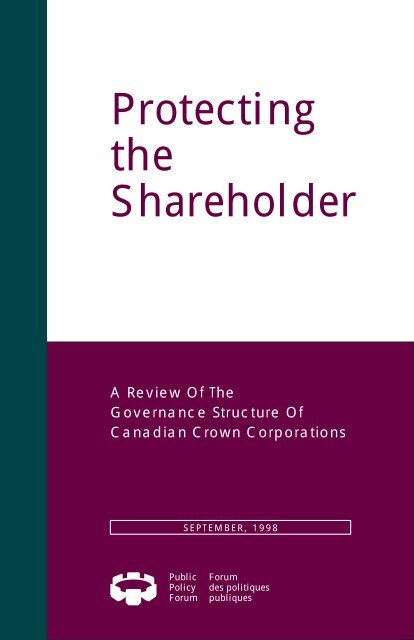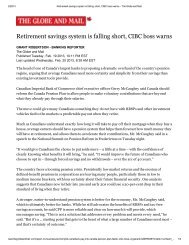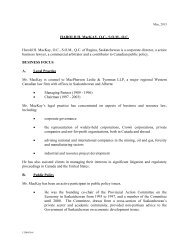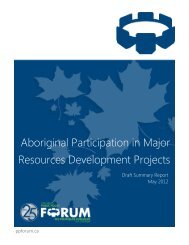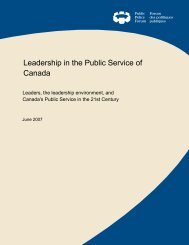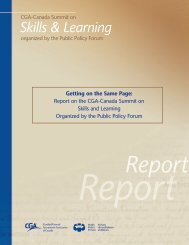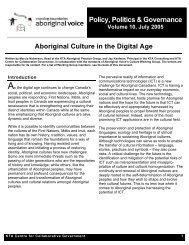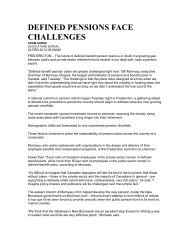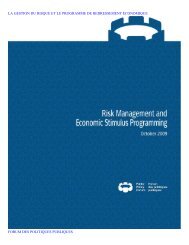Protecting the Shareholder - Public Policy Forum
Protecting the Shareholder - Public Policy Forum
Protecting the Shareholder - Public Policy Forum
You also want an ePaper? Increase the reach of your titles
YUMPU automatically turns print PDFs into web optimized ePapers that Google loves.
<strong>Protecting</strong><strong>the</strong><strong>Shareholder</strong>A Review Of TheGovernance Structure OfCanadian Crown CorporationsSEPTEMBER, 1998<strong>Public</strong><strong>Policy</strong><strong>Forum</strong><strong>Forum</strong>des politiquespubliques
PUBLIC POLICY FORUM PROTECTING THE SHAREHOLDER 2<strong>Protecting</strong><strong>the</strong><strong>Shareholder</strong>About This ReportIn <strong>the</strong> spring of 1998, <strong>the</strong> <strong>Forum</strong> created an Advisory Committee onGovernance and Accountability, co-chaired by <strong>Forum</strong> boardmembers Kevin Lynch and Jeff Lipton.The committee identified <strong>the</strong> governance of Crown agencies at both<strong>the</strong> federal and provincial levels as an important issue worthy ofreview.The <strong>Forum</strong> would like to thank those individuals, from both <strong>the</strong>public and private sector, who were willing to share <strong>the</strong>irobservations, experiences and perspectives with us.We hope that <strong>the</strong> report that follows will stimulate debate andencourage continued improvement in <strong>the</strong> management of Canada'sCrown corporations.A Review Of TheGovernance Structure OfCanadian Crown CorporationsDavid ZussmanPresidentAbout The AuthorsSEPTEMBER, 1998Peter E. Larson, Ph.D. - <strong>Public</strong> <strong>Policy</strong> <strong>Forum</strong>Bill Neville - Hession, Neville and AssociatesBill Neville has had a long and distinguished career in publicpolicy in Canada. He is currently Chairman of Hession, Nevilleand Associates. He is also an Executive-in-Residence at <strong>the</strong> <strong>Public</strong><strong>Policy</strong> <strong>Forum</strong>.Dr. Peter Larson is Executive Vice-President of <strong>the</strong><strong>Public</strong> <strong>Policy</strong> <strong>Forum</strong>.
Table of ContentsExecutive Summary ..........................................................................4I. Introduction ..............................................................................5II.III.IV.Crown Agencies In Canada......................................................7The Governance Of Crown Corporations..............................11Recent Developments in Private Sector Governance.............11The Importance of Good Governancein Crown Corporations............................................................12Key differences between Crown corporationsand private enterprise .............................................................13• Mission...........................................................................14• Legal authority...............................................................14• Ownership .....................................................................15• Governance structure ....................................................16• Board selection ..............................................................18Recent Steps To Improve The GovernanceOf Crown Corporations ..........................................................20V. Analysis Of Key Governance Issues ......................................23• Crowns - Closely-held Corporations.............................23• The Complexity of Basic Relationships........................25• The Appointment Process.............................................28• The Role of <strong>the</strong> Chair.....................................................33• The Appointment of <strong>the</strong> President ...............................35• Streng<strong>the</strong>ning Accountability .......................................37VI. Summary Of Recommendations ............................................39Appendix I.Basic Information OnCrown Corporations Studied .................................41Appendix II. Contributors ............................................................48Appendix III. Bibliography ...........................................................51PUBLIC POLICY FORUM PROTECTING THE SHAREHOLDER 4Executive SummaryThe privatization of many Crown corporations ("Crowns") over <strong>the</strong>last decade has tended to obscure <strong>the</strong> fact that federal and provincialCrowns still play a very important role in our society. In total, over800 Canadian Crown corporations - from B.C. Hydro to a fishmarketing board in Newfoundland - employ 120,000 people and areresponsible for managing over $ 100 billion in public assets.But for <strong>the</strong>se organizations, <strong>the</strong> stable protected monopoly of <strong>the</strong>past has been replaced by rapidly changing technology,deregulation, and global competition. Many are being challengedin <strong>the</strong> marketplace as never before. In this highly competitiveenvironment, <strong>the</strong> public interest demands that <strong>the</strong>ir governancestructure be efficient and effective.In <strong>the</strong> winter of 1997, while working closely with one Crown agency,<strong>the</strong> <strong>Public</strong> <strong>Policy</strong> <strong>Forum</strong> became increasingly concerned that <strong>the</strong>governance structure of our major Crowns was due for review. Wefelt that Crown corporations could benefit from a review of <strong>the</strong>irapproach to governance, particularly in light of recent attentionpaid to this issue by <strong>the</strong> private sector.As a result, we interviewed a wide range of responsible officials -ministers, <strong>the</strong> chairs and chief executives of Crowns and boardmembers as well as senior officials from various central agencies.We asked <strong>the</strong>m whe<strong>the</strong>r <strong>the</strong>y felt that <strong>the</strong>ir organizations had <strong>the</strong>appropriate governance structures (and people) to defend <strong>the</strong>interests of <strong>the</strong>ir ultimate shareholder, <strong>the</strong> people of Canada.It would be an exaggeration to suggest that <strong>the</strong> governance of Crowncorporations is completely ineffective or has broken down.Generally speaking, Canadian Crowns are properly directed andwell managed. But our study indicates that <strong>the</strong>re are flaws in <strong>the</strong>current governance structure.Some of <strong>the</strong>se weaknesses can be remedied by more consistent
PUBLIC POLICY FORUM PROTECTING THE SHAREHOLDER 5applications of guidelines already in place. O<strong>the</strong>rs will requireclarification of roles and responsibilities.But we also conclude that more attention should be paid to <strong>the</strong>recruitment of members of Crown corporation boards, and that <strong>the</strong>seboards should play a fuller and more active role in <strong>the</strong> stewardshipof <strong>the</strong>ir respective organizations, including strategic planning,succession planning, and <strong>the</strong> selection of <strong>the</strong> chief executive.
PUBLIC POLICY FORUM PROTECTING THE SHAREHOLDER 6PUBLIC POLICY FORUM PROTECTING THE SHAREHOLDER 7IIntroductionCrown corporations have played a vital role in Canada'sdevelopment as a nation since Confederation. In key sectors liketransportation, power, and communications, public enterprise tookon critical tasks that private enterprise was unwilling, or unable, toassume. The resulting organizations, like <strong>the</strong> CBC, CN, and HydroQuebec, became symbols of <strong>the</strong> country's values and aspirations.But over <strong>the</strong> last two decades, several important changes have takenplace in <strong>the</strong> environment of Crown corporations (often referred toas simply, "Crowns"):• The original public policy objectives of many Crowns -developing a basic infrastructure in rail or airtransportation, communications or power generation - havebeen met. As a result, several have been privatized, and<strong>the</strong>re is debate about <strong>the</strong> future of many more.• Increased public antipathy toward all forms of governmentmeans that <strong>the</strong>re is less public support for <strong>the</strong> notion ofpublic enterprise.agencies (Ontario Hydro, B.C. Hydro, CBC, Canada Post, and <strong>the</strong>Royal Canadian Mint, to name a few) raise serious questions abouthow well our Crowns are governed and whe<strong>the</strong>r <strong>the</strong> huge taxpayerinvestment is well protected. When Crown corporations like OntarioHydro end up with billions of dollars of "stranded" assets, one hasto wonder whe<strong>the</strong>r appointments to Hydro's board have been madewith a greater eye to "representational equity" than to commercialacumen.In <strong>the</strong> winter of 1997 <strong>the</strong> <strong>Public</strong> <strong>Policy</strong> <strong>Forum</strong>'s board identified"Governance and Accountability in <strong>the</strong> <strong>Public</strong> Sector" as one of itsmain priorities. Later that year, while working with one Crownagency, <strong>the</strong> <strong>Forum</strong> became increasingly concerned that <strong>the</strong>governance structure of our major Crown corporations deservedcloser scrutiny. We felt that Crown corporations could benefit froma review of <strong>the</strong>ir approach to governance, particularly in light ofrecent work undertaken in <strong>the</strong> private sector by <strong>the</strong> Toronto StockExchange. 1We recognize, of course, that not all of <strong>the</strong> challenges facing Crownsstem directly from weaknesses in <strong>the</strong>ir governance structures. Butas Crown agencies enter into an increasingly difficult andcompetitive environment, it is important that <strong>the</strong>ir governancestructures be as effective as possible.• The effective monopoly once enjoyed by certain Crownsand protected by legislation, (e.g. Canada Post, OntarioHydro) is being radically undermined by new technology,global competition, and market deregulation.• Many Crowns have had <strong>the</strong>ir levels of public subsidyreduced severely. Government/shareholders, facingsignificant economic constraints, are demanding a betterreturn on <strong>the</strong>ir investments. Those that make a profit arebeing asked to provide more.The result is that many Crown agencies are in trouble, and <strong>the</strong>Canadian public could be at significant financial risk. The recentfinancial and management difficulties of a number of Crown
PUBLIC POLICY FORUM PROTECTING THE SHAREHOLDER 10 PUBLIC POLICY FORUM PROTECTING THE SHAREHOLDER 11Commercial agencies which carry on "business" in a commercialsense. Most of <strong>the</strong>se are constituted as "Crown corporations,"providing products or services which <strong>the</strong>y sell to customers. Theymay or may not get subsidies from government, but a significantpercentage of <strong>the</strong>ir revenues come from selling a good or service tocustomers. (Examples: Ontario Hydro, Canada Post, BC FerriesCorporation).Crown corporations are designed to have some "freedom" fromgovernment. One reason is to improve administrative efficiency. Inorder to effectively compete in <strong>the</strong> market, Crown agencies need tobe able to make a wide range of management decisions (where tolocate a post office, for example) without undue interference from<strong>the</strong> political level. The o<strong>the</strong>r reason is to insulate <strong>the</strong> agency fromeditorial or political interference in <strong>the</strong> actual work of <strong>the</strong>organization. The CBC is at arms length, not only to improveefficiency, but to protect its independence and credibility as a nonpartisan,non-political news and cultural agency.complain that <strong>the</strong> service is poor and costly, whilecompetitors complain of unfair (i.e., state subsidized)competition.• They live in <strong>the</strong> same "glass house" environment of publicscrutiny as politicians and public servants, quite differentfrom <strong>the</strong> private sector environment.• They have a sole shareholder - <strong>the</strong> government.Notwithstanding this legal simplicity however, <strong>the</strong>shareholder's views are effectively represented by severaldifferent individuals including <strong>the</strong> responsible minister, <strong>the</strong>minister of finance and <strong>the</strong> prime minister (or provincialpremier). Each of <strong>the</strong>se has his or her own priorities andagenda, not all of which may be entirely compatible.This study looks specifically at governance questions associated onlywith Crown commercial agencies known as Crown corporations.This group includes almost all of <strong>the</strong> largest agencies, like CanadaPost, CBC, and provincial hydro and liquor retail companies. Theyexist as Crown agencies because <strong>the</strong>y do things that privateenterprise, unincented, would not do - things like deliver letters to<strong>the</strong> North West Territories, or lend money to risky small businesses,or insure <strong>the</strong> mortages of low income families.Although Crown corporations bear many similarities to <strong>the</strong>ir privatesector cousins, <strong>the</strong>y share a number of distinguishing characteristics:• They have a mixture of "public policy" and "commercial"objectives. In most cases, <strong>the</strong> market is not sufficient tosupport <strong>the</strong> whole of <strong>the</strong> enterprise. Or, to put it ano<strong>the</strong>rway, <strong>the</strong> public interest may demand that service beprovided to a broader market than that which would justifyitself commercially.• They usually have a monopoly position enforced bylegislation. This places <strong>the</strong>m in an awkward position withregard to both customers and competitors. Customers always
PUBLIC POLICY FORUM PROTECTING THE SHAREHOLDER 12 PUBLIC POLICY FORUM PROTECTING THE SHAREHOLDER 13III. The Governance Of CrownCorporationsRecent Developments in Private Sector GovernanceWhen several significant Canadian companies failed in <strong>the</strong> early1990s, causing losses for thousands of investors, a wave of concernswept over <strong>the</strong> Canadian public. Some editorialists called forincreased state regulation, o<strong>the</strong>rs questioned <strong>the</strong> quality of corporatemanagement. But much of <strong>the</strong> criticism focused on whe<strong>the</strong>r <strong>the</strong>boards of directors of <strong>the</strong>se companies had acted appropriately.Many felt that <strong>the</strong> directors had blindly followed management over<strong>the</strong> abyss, ra<strong>the</strong>r than actively protecting <strong>the</strong> interests ofshareholders.In response to <strong>the</strong>se concerns, and no doubt in part to pre-empt anyregulatory move by government, <strong>the</strong> Toronto Stock Exchange (TSE)asked former Chairman Peter Dey to develop guidelines forimproved corporate governance in Canada. 4Dey's report, aptly entitled Where Were <strong>the</strong> Directors? 5 , made anumber of recommendations and proposed guidelines for improvedcorporate governance. The general thrust of Dey's recommendationswas to reaffirm <strong>the</strong> position of <strong>the</strong> Board of Directors at <strong>the</strong> top of<strong>the</strong> governance structure of <strong>the</strong> organization. He reasserted that <strong>the</strong>board should explicitly assume responsibility for <strong>the</strong> stewardshipof <strong>the</strong> corporation and specifically pointed to:• <strong>the</strong> adoption of a strategic planning process• <strong>the</strong> identification of <strong>the</strong> principal risks to <strong>the</strong> corporation• <strong>the</strong> development of a succession plan for seniormanagement• <strong>the</strong> development of a communications policy• <strong>the</strong> integrity of <strong>the</strong> corporation's internal control andmanagement information systems.Many of Dey's specific recommendations were designed to reinforce<strong>the</strong> independence of <strong>the</strong> board from management, including <strong>the</strong>principle that a majority of directors be unrelated to management.Dey also recommended that each board create a committee withresponsibility for developing <strong>the</strong> corporation's response to"governance" issues.Dey recommended that <strong>the</strong> TSE demand that companies report on<strong>the</strong>ir approach to governance, and be encouraged to explain anyvariance between <strong>the</strong>ir own approach and that suggested in hisguidelines.Although <strong>the</strong> Dey report was not universally embraced, in general,<strong>the</strong> thrust of <strong>the</strong> report was well accepted, and most major privatecorporations in Canada quickly adjusted <strong>the</strong>ir practices to reflectDey's recommendations. For example, most TSE-listed companiesnow have a governance committee, and include a report on <strong>the</strong>irgovernance structure as part of <strong>the</strong>ir annual report to shareholders.The Importance of Good Governance in Crown CorporationsOur society is not as trusting of organizations as it once was.Canadians are looking for better management - more efficiency, moreaccountability, and more transparency. This applies not only tobusiness but to governments as well. In a 1997 article, DavidZussman documented <strong>the</strong> declining level of public confidence inour public institutions. 6Recently, this general public concern has been augmented by callsfor a closer focus on <strong>the</strong> management of Crown agencies. The 1996-4Nei<strong>the</strong>r <strong>the</strong> pressures, nor <strong>the</strong> responses are unique to Canada. Similar causes ledto <strong>the</strong> 1987 Report on <strong>the</strong> Financial Aspects of Corporate Governance in <strong>the</strong> UnitedKingdom (known as <strong>the</strong> "Cadbury Report" after its principal author Lord Cadbury)and and <strong>the</strong> Report of <strong>the</strong> National Commission on Fraudulent Financial Reporting(Known as <strong>the</strong> Treadway Commission in <strong>the</strong> United States.5Peter Dey, Where Were <strong>the</strong> Directors? The Report of <strong>the</strong> Toronto Stock ExchangeCommittee on Corporate Governance in Canada, (Toronto, 1994)
PUBLIC POLICY FORUM PROTECTING THE SHAREHOLDER 14 PUBLIC POLICY FORUM PROTECTING THE SHAREHOLDER 151997 report of <strong>the</strong> Auditor General of British Columbiarecommended a complete review of <strong>the</strong> governance of <strong>the</strong> province'sCrown corporations. 7 At <strong>the</strong> same time, at <strong>the</strong> o<strong>the</strong>r end of <strong>the</strong>country, <strong>the</strong> Auditor General of New Brunswick was expressingsimilar concerns in that province. 8The issue has also received attention at <strong>the</strong> federal level. In 1996,<strong>the</strong> Senate Standing Committee on Banking, Trade and Commerceundertook a comprehensive review of <strong>the</strong> Canada BusinessCorporation Act. It recommended that “a study be undertaken of<strong>the</strong> principles of corporate governance as <strong>the</strong>y relate to CrownCorporations. It is <strong>the</strong> view of <strong>the</strong> Committee that <strong>the</strong> generalprinciples of corporate governance should apply to CrownCorporations.” 9Clearly, <strong>the</strong> governance of Crown corporations makes a differenceto Canadians and to <strong>the</strong>ir governments. Do <strong>the</strong>y have <strong>the</strong> directors,chief executives, and management to take <strong>the</strong>m forward successfuly?Are roles and responsibilities clearly defined? Or, are accountabilitiesso hopelessly confused that commercial viability is impossible? 10Key Differences betweenCrown Corporations and Private EnterpriseCrown corporations resemble private corporations in many ways.The structure and balance sheet of a Crown corporation like <strong>the</strong>Business Development Bank of Canada, for example, may look verymuch like that of a commercial bank. But Crowns are not exactlylike commercial ventures, and it is important to understand <strong>the</strong>irdistinctive features before discussing <strong>the</strong>ir governance.6Zussman, David, "Do Citizens Trust Their Governments?, vol. 40, no. 2, Canadian<strong>Public</strong> Administration, (DATE).7British Columbia, Auditor General , Crown Corporations governance Study(Victoria: 1997).8Report of <strong>the</strong> Auditor General of New Brunswick, 1996. Chapter 10 , "CrownCorporation Governance," (Fredericton: 1997).9Canada, Senate Standing Committee on Banking, Trade and Commcerce, Report of<strong>the</strong> Committee, (Chairman, <strong>the</strong> Honourable Michael Kirby) (Ottawa: August 1966).• MissionUnlike commercial enterprises, shareholder value is notdetermined solely by <strong>the</strong> balance sheet. This is because mostCrowns are driven by a mixture of commercial and publicpolicy objectives. 11The Business Development Bank of Canada, for example,exists to offer a service that purely commercial organizationsdo not provide. Its value to its owner, <strong>the</strong> government ofCanada, lies both in its balance sheet, and in its ability tofoster small business in Canada. Earning revenues isimportant, but it is not <strong>the</strong> only, or even <strong>the</strong> principal,objective of <strong>the</strong> bank.This mix of commercial and political objectives lies at <strong>the</strong>heart of every Crown agency, and drives its legal framework,structure, and activities.• Legal authorityPrivate enterprises operate under federal or provincial statutes(or both) which give <strong>the</strong> board of directors of <strong>the</strong> organizationbroad latitude to undertake any commercial activities notproscribed by law.Crown corporations are much more closely regulated both asto what business <strong>the</strong>y can be in, and how business must beconducted. This control is exercised through a variety ofstatutes.10Despite <strong>the</strong>se concerns, <strong>the</strong>re is evidence that Crown corporations actually dobetter than private ones in some key areas of governance. Based on Conference Boarddata, crown corporation boards are more likely to play a role in shaping strategy,have fewer "insiders" and reflect more gender and regional diversity than <strong>the</strong>ir privatesector counterparts. They are also much more likely to separate <strong>the</strong> Chair and CEOfunctions as recommended by <strong>the</strong> Dey committee. See "Current Governance Practicesin Canadian <strong>Public</strong> Enterprise, 1996), Conference Board of Canada."11By "public policy objectives," we refer to broad objectives that are, in <strong>the</strong> main,independent of <strong>the</strong> political party in power. Fostering <strong>the</strong> development of Canadianculture, for example, is a public policy objective shared by all major political parties.And all agree that this should be one of <strong>the</strong> objectives of <strong>the</strong> CBC. Crown corporationsare also influenced, of course, by <strong>the</strong> narrower "political objectives" of specific partiesand specific ministers.
PUBLIC POLICY FORUM PROTECTING THE SHAREHOLDER 16 PUBLIC POLICY FORUM PROTECTING THE SHAREHOLDER 17The principal piece of legislation for most of <strong>the</strong> majorCrowns is <strong>the</strong>ir own specific act. The Hydro and PowerAuthority Act (1996), for example, sets out <strong>the</strong> powers andlimitations of BC Hydro. It also specifies <strong>the</strong> process for <strong>the</strong>nomination of both board members and senior management.In addition, Crown agencies also fall under <strong>the</strong> control of arange of o<strong>the</strong>r acts which regulate public business. In <strong>the</strong>federal government, most Crown corporations fall under <strong>the</strong>Financial Administration Act, for example. This requires <strong>the</strong>submission of an annual report and summaries of <strong>the</strong>approved corporate plan and budget for tabling inParliament.• OwnershipIn private enterprise, <strong>the</strong> most common form of ownershipis <strong>the</strong> joint stock company. Depending on <strong>the</strong> distribution ofshare ownership, private enterprises can be "privatelyowned," "closely held," or "widely held."Crown corporations, on <strong>the</strong> o<strong>the</strong>r hand, are created bygovernment, and wholly owned by it. This is usuallyspecified in <strong>the</strong> enabling legislation. Those involved in <strong>the</strong>management of crown corporations often refer to <strong>the</strong>government as "<strong>the</strong> shareholder", but in most cases this is afigure of speech - <strong>the</strong>re are no equity shares.Legally, ownership is vested in <strong>the</strong> Governor General (orLieutenant Governor, in <strong>the</strong> case of provincial Crowns) as<strong>the</strong> representative of <strong>the</strong> Crown. In practice, however, <strong>the</strong>Governor General plays only a de jure role. The effectiveowner is <strong>the</strong> government of <strong>the</strong> day, and many majordecisions (e.g., appointments) are made by Cabinet decisioncalled an "Order-in-Council."Different governments have different rules for who bringswhat to Cabinet, and depending on <strong>the</strong> issue, certainministers might be expected to have more influence thano<strong>the</strong>rs. These might include:• <strong>the</strong> Prime Minister• <strong>the</strong> finance minister• <strong>the</strong> treasury minister• <strong>the</strong> minister responsible for <strong>the</strong> agency in Parliament• any o<strong>the</strong>r minister who might be particularly impacted bydecisions regarding any Crown agency.• Governance structureThe basic governance structure of a private company is fairlystraightforward. Governance of <strong>the</strong> corporation is vested ina board of directors, elected by shareholders at an annualmeeting. As <strong>the</strong> elected representatives of <strong>the</strong> shareholders,<strong>the</strong> board has complete powers, within <strong>the</strong> law, to direct <strong>the</strong>company on behalf of shareholders as it sees fit. Each boardcreates appropriate committees to carry out its work. It isresponsible for <strong>the</strong> election of its own chairman, and for <strong>the</strong>stewardship of <strong>the</strong> organization - including <strong>the</strong> selection andcompensation of a chief executive.The structure of a Crown corporation bears much similarityto that of a private corporation. There is a board of directors,a chairman of <strong>the</strong> board, and a CEO. Normally <strong>the</strong> chairmanand CEO functions are separated. Recently, many Crownshave created "governance" committees. But <strong>the</strong> relationships,responsibilities, and accountabilities of <strong>the</strong> board, <strong>the</strong> chair,and <strong>the</strong> CEO are very different from those in a privatecorporation. Instead of <strong>the</strong> usual cascading relationshipbetween board, chair, and CEO, in most Crowns, <strong>the</strong>chairman, <strong>the</strong> CEO, and <strong>the</strong> board members are all namedby <strong>the</strong> government.Crown agency strategic plans must be approved by centralfinancial agencies. As a result, <strong>the</strong> board of a Crown agencyalso often has a lot less say in deciding <strong>the</strong> strategic directionof <strong>the</strong> organization. The CEO and <strong>the</strong> management teamspend as much time working with <strong>the</strong> Treasury Board orManagement Board officials on <strong>the</strong> strategic plan as <strong>the</strong>y dowith <strong>the</strong>ir own board.
PUBLIC POLICY FORUM PROTECTING THE SHAREHOLDER 18 PUBLIC POLICY FORUM PROTECTING THE SHAREHOLDER 19Diagram A: Typical Governance Structure of Widely-Held <strong>Public</strong> CorporationsSHAREHOLDERSBOARDCHAIRCEOOn paper, <strong>the</strong> governance structure of a widely held public corporation isstraightforward. <strong>Shareholder</strong>s elect directors according to <strong>the</strong> number ofshares <strong>the</strong>y hold. In fact, of course, management has a large influence inshaping <strong>the</strong> board and in formulating strategy. In addition, a number ofo<strong>the</strong>r players - from analysts to brokers, are important influencers of policy.Diagram B: Typical Governance Structure of Major Federal CrownsSHAREHOLDERIn o<strong>the</strong>r words, <strong>the</strong> Crown corporation board rarely has <strong>the</strong>power (or influence) normally associated with <strong>the</strong> role of aboard in <strong>the</strong> private sector. It does not select its ownchairman, nor does it select or dismiss <strong>the</strong> CEO. Sometimes<strong>the</strong> board is asked to "evaluate" <strong>the</strong> CEO, but final decisionson compensation are not board decisions, but governmentdecisions.It would be a mistake, however, to imply that Diagram Bportrays a structure and relationship that are unworkable ordysfunctional. To <strong>the</strong> contrary, <strong>the</strong> lines of communicationbetween <strong>the</strong> multidimensional shareholder, on one hand,and <strong>the</strong> Crown board and management, on <strong>the</strong> o<strong>the</strong>r, aregenerally understood by <strong>the</strong> participants and, in most cases,allow each to exercise <strong>the</strong>ir assigned responsibilities. Indeed,it is hard to imagine a simple way to reconcile <strong>the</strong> variouscompeting interests. It is possible, however, that <strong>the</strong>functioning can be improved with some clarification ofrespective roles and reporting lines.• Board recruitmentIn <strong>the</strong> private sector, normal practice is for a boardcommittee, usually <strong>the</strong> nominating or governancecommittee, to propose a list of candidates for boardmembership. This list, after endorsement by <strong>the</strong> full board,is presented to shareholders for approval.TREASURYCEOFINANCEPCOPRIMEMINISTERPMOCHAIRMINISTERBOARDIn Crown corporations, on <strong>the</strong> o<strong>the</strong>r hand, boardnominations are made by <strong>the</strong> cabinet through what is knownas an "Order-in-Council." In <strong>the</strong> Federal government, Orderin-Council(or OIC) appointments 12 are coordinated through<strong>the</strong> Appointments Secretariat of <strong>the</strong> Prime Minister's Office(PMO). 13 In <strong>the</strong> Federal government, <strong>the</strong> AppointmentsSecretary makes final recommendations to Cabinet. Theserecommendations are based on at least four sources ofinformation:On paper, <strong>the</strong> governancy structure of <strong>the</strong> Crown looks hopelesslycomplicated, but <strong>the</strong> practice is not totally different from that of a privatesector corporation. Management has to satisfy many interests, but operateswith a broad autonomy.1. The responsible minister. Because Crown corporationsare instruments of government, <strong>the</strong>re is always a "responsibleminister" who answers to Parliament for <strong>the</strong> operations of
PUBLIC POLICY FORUM PROTECTING THE SHAREHOLDER 20PUBLIC POLICY FORUM PROTECTING THE SHAREHOLDER 21each Crown. The Minister of <strong>Public</strong> Works and GovernmentServices, for example, is responsible for a portfolio of Crowncorporations including Canada Post and <strong>the</strong> Royal CanadianMint. Names inevitably come to <strong>the</strong> minister's attention froma variety of sources as possible candidates for appointmentto <strong>the</strong> board. If <strong>the</strong> minister approves, he or she may forwardsome of <strong>the</strong> names to <strong>the</strong> PMO for consideration.are not. Prestige and a desire to "do something for <strong>the</strong>country" are <strong>the</strong> most common motives for candidates.Financial reward, on <strong>the</strong> o<strong>the</strong>r hand, is not. As a generalrule, OIC appointments pay very little - a subject we willcome back to.2. Representatives of <strong>the</strong> Crown agency itself. TheAppointments Secretariat invites <strong>the</strong> chairs and CEOs ofCrown agencies to describe <strong>the</strong> profiles of <strong>the</strong> kinds ofpeople <strong>the</strong>y want to have on <strong>the</strong>ir boards. Some are moreproactive than o<strong>the</strong>rs in doing so.3. The Privy Council Office (PCO). The PCO is responsiblefor <strong>the</strong> management of <strong>the</strong> whole cadre of senior public executives,including those working in Crown corporationsfrom both a performance and compensation perspective. As<strong>the</strong> central coordinating agency for government, <strong>the</strong> PCOreflects <strong>the</strong> views of any o<strong>the</strong>r line department or agencywhich might have an interest in <strong>the</strong> Crown agency. Amongo<strong>the</strong>r things, <strong>the</strong> PCO bears responsibility for ensuring thatpersons suggested for office do not carry any potential liabilities(for example, conflicts of interest).4. The Prime Minister's Office (PMO). The PMO is <strong>the</strong>"political" adviser to <strong>the</strong> Prime Minister. This is where <strong>the</strong>political structure of <strong>the</strong> party in power gets to have a say inwho gets "rewarded" by appointments. Names come forwardfrom many sources - defeated candidates, former ministers,party friends, and organizers. Many are well qualified, some12OIC appointments are commonly known as "patronage" appointments because <strong>the</strong>yare, in <strong>the</strong> final analysis political appointments made by <strong>the</strong> Prime Minister.None<strong>the</strong>less, calling <strong>the</strong>m patronage appointments tends to obscure <strong>the</strong> fact that <strong>the</strong>appointment process entails a number of different considerations of which politicalloyalty may not be <strong>the</strong> only, or even <strong>the</strong> most important, factor.13What is described here is <strong>the</strong> federal process. Provincial governments each have<strong>the</strong>ir own structures which do not match exactly to <strong>the</strong> federal ones. However, <strong>the</strong>general approach is quite similar.
PUBLIC POLICY FORUM PROTECTING THE SHAREHOLDER 22IV. Recent Steps To ImproveThe Governance Of CrownCorporationsOpposition parties always accuse <strong>the</strong> government in power of usingpatronage in its appointments. The criticisms <strong>the</strong>mselves are oftenself-serving, but not completely without basis. Following <strong>the</strong> TSEreview of corporate governance in <strong>the</strong> private sector, howevercriticism focused on whe<strong>the</strong>r excessive patronage was weakeninggovernance of major Crowns.In 1994, Gerard Veilleux, a respected federal public servant on loanto <strong>the</strong> Canadian Centre for Management Development (CCMD),reviewed <strong>the</strong> appointment process to boards of directors of Crowncorporations. He observed that "political affiliation has inevitablyplayed a large part in <strong>the</strong> appointment process, which, in recentyears, has drawn media coverage." He also noted that "in manyinstances <strong>the</strong>re is scepticism about <strong>the</strong> value-added by some Boardmembers." 14In his report, Veilleux did not attempt to argue that politicalaffiliation should have no role in <strong>the</strong> selection process. But he didargue that <strong>the</strong> appointment process should be more objective andtransparent, and recommended <strong>the</strong> use of "job profiles" outliningkey attributes sought from potential candidates to specific boards.He proposed that <strong>the</strong>se job profiles should be developed inconsultation with various stakeholders - including <strong>the</strong> responsible14Veilleux, Gerard, "Unfinished Business: A Report on <strong>the</strong> Appointment Process toBoards of Directors of Crown Corporations" (Ottawa: Canadian Centre forManagement Development, March 1994.)15"Corporate Governance in Crown Corporations and o<strong>the</strong>r <strong>Public</strong> Enterprises:Guidelines," (Ottawa: Crown Corporations and Privatization Sector, Department ofFinance and Treasury Board Secretariat, 1996).
PUBLIC POLICY FORUM PROTECTING THE SHAREHOLDER 23 PUBLIC POLICY FORUM PROTECTING THE SHAREHOLDER 24minister, <strong>the</strong> chair and <strong>the</strong> CEO of <strong>the</strong> each Crown agency, and <strong>the</strong>current members of its board.He also recommended that board members receive better training,and urged Treasury Board to undertake a general review of <strong>the</strong>relative performance of boards and of <strong>the</strong> means to enhance <strong>the</strong>iraccountability.In partial response, Treasury Board Secretariat and <strong>the</strong> Departmentof Finance released new "guidelines" for corporate governance inCrown corporations and o<strong>the</strong>r public enterprises in July 1996. Theguidelines present recommendations categorized into three broadareas of responsibility: stewardship, board-management relations,and functioning of <strong>the</strong> board. 15The ten guidelines stipulate that <strong>the</strong> board of directors of everyCrown corporation should:1. explicitly assume responsibility for <strong>the</strong> stewardship of <strong>the</strong>corporation. This should include: (i) approving <strong>the</strong> strategicplan, (ii) risk identification and management, (iii)succession planning, and (iv) ensuring an adequateinformation management system.9. review <strong>the</strong> adequacy and form of compensation of boardmembers10. develop a corporate approach to governance.Our own research revealed that <strong>the</strong> guidelines (and <strong>the</strong>recommendations of <strong>the</strong> Veilleux report) have been unevenlyapplied. Some Crown corporations have reviewed and modified<strong>the</strong>ir own governance procedures in light of <strong>the</strong> Treasury Boardguidelines, while o<strong>the</strong>rs have been less active.One o<strong>the</strong>r positive development in <strong>the</strong> field of Crown corporationgovernance should also be signalled. The Conference Board ofCanada has created a <strong>Public</strong> Enterprise Governance <strong>Forum</strong> aimedat fur<strong>the</strong>ring <strong>the</strong> practice of excellence in governance amongCanada's public institutions. This <strong>Forum</strong> undertakes comparativeresearch on governance practices, and provides a useful andpractical venue where those responsible for Crown corporationmanagement can compare and share best practices.2. periodically examine <strong>the</strong> public policy objectives and <strong>the</strong>legislated mandate to ensure continuing relevance3. ensure effective communication with <strong>the</strong> Crown, o<strong>the</strong>rstakeholders, and <strong>the</strong> public4. develop an effective working relationship withmanagement5. guard its ability to function independently6. periodically assess <strong>the</strong> performance of <strong>the</strong> CEO7. periodically assess its own effectiveness and initiate itsown renewal8. ensure directors have <strong>the</strong> orientation and educationnecessary to fulfill <strong>the</strong>ir responsibilities
PUBLIC POLICY FORUM PROTECTING THE SHAREHOLDER 25 PUBLIC POLICY FORUM PROTECTING THE SHAREHOLDER 26V. Analysis Of KeyGovernance IssuesIn <strong>the</strong> winter of 1997, after intensive discussions with <strong>the</strong>management of one major crown agency, <strong>the</strong> <strong>Public</strong> <strong>Policy</strong> <strong>Forum</strong>became concerned that <strong>the</strong> governance structure of our major Crowncorporations was due for review. We felt that a review of <strong>the</strong>irapproach to governance was appropriate, particularly in light ofrecent work undertaken in <strong>the</strong> private sector by <strong>the</strong> Toronto StockExchange and o<strong>the</strong>rs.As a result, we interviewed a wide range of responsible officials -ministers, <strong>the</strong> chairs and chief executives of Crowns, and boardmembers as well as senior officials from various central agencies.Among o<strong>the</strong>r things we asked <strong>the</strong>m: Who is <strong>the</strong> "shareholder"? Howdo you define "shareholder value"? How do <strong>the</strong> shareholderstransmit <strong>the</strong>ir objectives to <strong>the</strong> Crown corporation? Areaccountabilities and responsibilities aligned optimally? Do we have<strong>the</strong> right people on Crown boards? How effective are Crown boards?Their answers form <strong>the</strong> basis of <strong>the</strong> analytical section below.Crowns - Closely-held CorporationsIn <strong>the</strong> jargon of private corporation governance, Crown corporationsare "closely-held" institutions. Governments are <strong>the</strong> dominant,indeed usually <strong>the</strong> sole shareholder, and, as such, <strong>the</strong>y exerciseconsiderable control over <strong>the</strong> direction and even <strong>the</strong> operation of<strong>the</strong>ir Crown corporations.Through legislation, governments - and legislatures - providecorporations with <strong>the</strong>ir basic mandates and structures. ThroughCabinet or ministerial orders <strong>the</strong>y often provide specific policydirection. By Order-in-Council <strong>the</strong>y appoint <strong>the</strong> boards of directors,including <strong>the</strong>ir chairs, as well as <strong>the</strong> presidents or chief executiveofficers whose compensation are set by Cabinet as well. Crowncorporation budgets are subject to <strong>the</strong> overall fiscal policy of <strong>the</strong>government and annual corporate plans are submitted for reviewby <strong>the</strong> responsible ministers and/or Treasury Board.Given that shareholder governments retain so much power andinfluence over <strong>the</strong>ir Crowns, it is worth asking how independentCrown corporation directors really are (even if <strong>the</strong>y are largely"unrelated" by TSE guideline standards) and how much genuineauthority <strong>the</strong>y exert over <strong>the</strong> corporation. Or are <strong>the</strong>y, in fact, morein <strong>the</strong> nature of advisory committees similar to those which havereplaced supposed independent boards of directors in many privateCanadian corporations which have a dominant or controllingshareholder, often a nonCanadian one? This move to <strong>the</strong> advisorycommittee model appears to acknowledge <strong>the</strong> hard fact thatcontrolling shareholders call <strong>the</strong> shots in most matters of importance- as well as respond to concerns of directors about liability. (Thisconcern does not exist in <strong>the</strong> case of Crowns. Directors are notpersonally liable for actions undertaken by <strong>the</strong> Crown agency ofwhich <strong>the</strong>y are a director.)One option, <strong>the</strong>n, might be to apply this private sector model tocrown corporations, that is to formally redesignate <strong>the</strong>ir boards ofdirectors as advisory committees. It would <strong>the</strong>n be clear that <strong>the</strong>irrole is not to make decisions, but simply to advise management,and perhaps <strong>the</strong> shareholder, on relevant issues based on <strong>the</strong>directors "once removed" assessments and experience, including<strong>the</strong>ir geographic and demographic perspectives.The problem with this approach is that it would virtually destroyany notion that <strong>the</strong>se corporations are, in fact, arms length from<strong>the</strong>ir governments and independent of <strong>the</strong>m in day-to-dayoperations and content. One would end up with an even moredirect-line relationship between Crown management and <strong>the</strong>government with no one effectively in between to provide somecheck on both sides. It would be better, we suggest, for Crown boardsto be real boards, and for any impediments to that reality to beopenly examined and corrected.Most of <strong>the</strong> boards examined for this study do perform some of <strong>the</strong>
PUBLIC POLICY FORUM PROTECTING THE SHAREHOLDER 27 PUBLIC POLICY FORUM PROTECTING THE SHAREHOLDER 28functions described as essential in current governance guidelines.They review and contribute to <strong>the</strong> corporation's strategic planningprocess and, through independent director audit committees,oversee <strong>the</strong> financial management and administration of <strong>the</strong>corporation. Many of <strong>the</strong>m help guide <strong>the</strong> corporation'scommunications programs, including its relations with <strong>the</strong>shareholder itself. Through human resources and/or compensationcommittees, <strong>the</strong>y approve senior management - o<strong>the</strong>r than <strong>the</strong>president appointments and compensation.But this was not <strong>the</strong> case of all <strong>the</strong> boards we studied. And in anyevent, <strong>the</strong>ir role was rarely decisive. If <strong>the</strong> objective is to have boardsof directors not serving as de facto advisory committees but ra<strong>the</strong>rbeing at <strong>the</strong> centre of Crown corporation governance, as we thinkshould be <strong>the</strong> case, and as Crown legislation suggests <strong>the</strong>y are, <strong>the</strong>na number of issues still need to be resolved.The Complexity of Basic RelationshipsRelations between shareholder-governments and <strong>the</strong>ir Crowncorporations are complex and, at times, confusing.On <strong>the</strong> government side, responsibility for Crowns is spread amonga number of individuals and departments. Each Crown has a"responsible" minister (usually <strong>the</strong> minister whose portfolioresponsibilities cover <strong>the</strong> Crown's area of operation) who serves as<strong>the</strong> Crown's day-to-day liaison point with government and whoreports to Parliament on its behalf. The duties of <strong>the</strong>se ministersincludes bringing forward policy submissions to Cabinet involving<strong>the</strong> Crown corporation, signing off on its annual corporate plan, andliaising with o<strong>the</strong>r ministers on <strong>the</strong> Crown's behalf.Responsible ministers play some role in <strong>the</strong> appointment of directors,chairs, and presidents of Crowns, but <strong>the</strong> effective power concerning<strong>the</strong>se items rests at <strong>the</strong> centre - with <strong>the</strong> Prime Minister, his office,and <strong>the</strong> Privy Council Office (PCO). They maintain <strong>the</strong> control fileson Order-in-Council appointments. The PMO, in particular, buildsand maintains <strong>the</strong> list of potential appointees and <strong>the</strong> Prime Ministerhimself exercises ultimate authority over significant appointments,especially those of <strong>the</strong> chairs and presidents of major Crowns.The o<strong>the</strong>r principal government player is <strong>the</strong> Treasury Board, asmall group of senior ministers. Its secretariat, toge<strong>the</strong>r with <strong>the</strong>PCO, provides advice on Crown governance and o<strong>the</strong>r policyquestions which may have widespread impact on Crowns ingeneral. Crown corporation annual plans and capital budgets arevetted by <strong>the</strong> Board.The result is a somewhat diffused power structure on <strong>the</strong>shareholder side of <strong>the</strong> ledger which often frustrates many of <strong>the</strong>principal players. While <strong>the</strong>y tend to spend surprisingly little timeoverseeing Crowns assigned to <strong>the</strong>m, responsible ministers expressfrustration at what, from <strong>the</strong>ir vantage point, seems an unevenapplication of <strong>the</strong> principle of Crown independence, or <strong>the</strong> armslengthrelationship. In practice, many ministers interpret <strong>the</strong>relationship to mean that <strong>the</strong>y are prohibited from exercising anydirect influence over a Crown's day-to-day operations - but <strong>the</strong>y areheld personally and politically accountable whenever thoseoperations derail.Based on our interviews, <strong>the</strong>re seems, in fact, to be little in <strong>the</strong> wayof agreed standards of engagement between Crowns and <strong>the</strong>irministers. As a general rule, <strong>the</strong> relationship flows from a very broadshared sense of purpose and direction through an informal, butpersonalized, working arrangement. In <strong>the</strong> best situations, ministersare kept well informed of Crowns' activities and given an adequate"heads up" - and at least an unofficial opportunity at influence -when issues arise that could have political consequences. At <strong>the</strong>o<strong>the</strong>r end of <strong>the</strong> spectrum, one finds ministers with little apparentinterest in <strong>the</strong>ir assigned Crowns and corporations who, for <strong>the</strong>irpart, act as if <strong>the</strong> less contact and informationsharing with <strong>the</strong>irminister, <strong>the</strong> better.One would like to believe <strong>the</strong>re could be a better, more consistent,basis for this relationship between ministers and <strong>the</strong> Crowncorporations for which <strong>the</strong>y are responsible, based on mutualacceptance of certain principles.The concept of an arms-length Crown corporation is an attempt tobalance <strong>the</strong> need for a public policy initiative against <strong>the</strong> need - forei<strong>the</strong>r competitive commercial or sensitive editorial reasons for
PUBLIC POLICY FORUM PROTECTING THE SHAREHOLDER 29 PUBLIC POLICY FORUM PROTECTING THE SHAREHOLDER 30operating independently and with freedom from <strong>the</strong> vagaries ofexcessive political interference. Such freedom and independenceof operation would seem to imply that responsibility for providingbroad policy direction to a Crown corporation rests squarely with<strong>the</strong> government which should be held accountable - to Parliamentand ultimately to <strong>the</strong> Canadian public - for it. This responsibilityshould embrace not only <strong>the</strong> legislative mandate provided to aCrown, but also <strong>the</strong> strategies and priorities pursued by <strong>the</strong> Crownin interpreting that mandate.On <strong>the</strong> o<strong>the</strong>r hand, managerial accountability should rest with <strong>the</strong>board of directors and senior management of <strong>the</strong> Crown agency. Adesignated minister may be <strong>the</strong> vehicle for reporting to Parliamenton such matters, but <strong>the</strong> Crown board members and managementshould speak for <strong>the</strong>mselves - and be judged for <strong>the</strong>mselves - beforeParliamentary committees and by interested stakeholders. Thismanagerial responsibility includes financial administration and <strong>the</strong>specific programs and activities developed by <strong>the</strong> Crown pursuantto its legislated mandate and strategies as agreed with <strong>the</strong>government.Both political and managerial accountability function best when<strong>the</strong>re is a frank and open dialogue between <strong>the</strong> Crown agency and<strong>the</strong> government through its responsible minister. Ministers do nothave a right to interfere in <strong>the</strong> day-to-day operations of a Crown, but<strong>the</strong>y do have a right not to be politically blindsided by <strong>the</strong>seoperations.This relationship between <strong>the</strong> responsible ministers and Crowncorporation(s) reporting to <strong>the</strong>m has taken on an added dimensionwith <strong>the</strong> current development of <strong>the</strong> concept of PortfolioManagement. This approach suggests that all of <strong>the</strong> structures withina minister's assigned area of responsibility - not just <strong>the</strong> formaldepartment but once-removed Special Operating Agencies (SOAs)and even Crowns - should be coordinated as an integrated wholefor policy planning and priority purposes.If <strong>the</strong> basic principles of responsibility and accountability as set outabove are clearly understood and respected, <strong>the</strong>re is no reason whyCrowns cannot actively participate in portfolio management. Indeed,it would seem logical that Crowns <strong>the</strong>mselves could benefit from aclear understanding of <strong>the</strong> broad over-arching policy directionsbeing pursued by <strong>the</strong>ir ministers across <strong>the</strong>ir portfolios. At <strong>the</strong> sametime, <strong>the</strong> process of developing and communicating <strong>the</strong>se directionscould benefit from having <strong>the</strong> perspective and expertise of a Crownagency. But such participation in portfolio management need notthreaten <strong>the</strong> ultimate arms length managerial independence ofCrowns.Portfolio management also helps bring into focus <strong>the</strong> role of <strong>the</strong>responsible minister's deputy minister in <strong>the</strong> relationship withvarious Crowns. The deputy minister is not a gate keeper or a filterin a Crown's relationship with its responsible minister. Crown chairsand senior management have, or should have, direct access to <strong>the</strong>irrespective ministers. But as <strong>the</strong> ministers most senior adviser onvirtually all matters within <strong>the</strong> minister’s portfolio, <strong>the</strong> deputyshould be informed of and consulted on important issues being putbefore <strong>the</strong> minister. The result may be differences in <strong>the</strong> adviceoffered <strong>the</strong> minister, but <strong>the</strong>se differences will reflect <strong>the</strong> particularperspectives inherent in each of <strong>the</strong>ir roles - and will not necessarilybe <strong>the</strong> result of unproductive jealousies or simple turf battles.To sum up this complex relationship, Crown corporations are bydefinition closely-held corporations and <strong>the</strong>ir dominant shareholder- <strong>the</strong> government - rightfully should provide strong policy andstrategic direction. What is required are Crown boards of directorswith sufficient competence, authority, and arms-lengthindependence to translate that broad direction into effective andefficiently managed operating plans and programs.The Appointment ProcessOne place to improve Crown corporation governance is <strong>the</strong> processthrough which directors are appointed to serve on Crown boards.The issue is not whe<strong>the</strong>r <strong>the</strong> government should exercise <strong>the</strong> rightto appoint individuals to <strong>the</strong>se boards. Appointment of directors isa fundamental shareholder prerogative whe<strong>the</strong>r corporations arepublic or private, widely or closely held. (The procedure adoptedin recent years of having appointees to significant federal Crowncorporations examined by <strong>the</strong> appropriate Parliamentary committee,
PUBLIC POLICY FORUM PROTECTING THE SHAREHOLDER 31 PUBLIC POLICY FORUM PROTECTING THE SHAREHOLDER 32should <strong>the</strong> committee so desire, is a vetting process, be it after-<strong>the</strong>fact,that one does not find elsewhere).Nor is <strong>the</strong> real issue <strong>the</strong> political affiliation of individuals appointedto Crown boards. The management of most Crowns say <strong>the</strong>y find ituseful to have directors who understand and share <strong>the</strong> directionsand priorities of <strong>the</strong> government shareholder and who can, whencalled upon, contact senior decision makers and influencers within<strong>the</strong> political structure. It is <strong>the</strong> experience of most Crown agenciesthat excessive partisanship is left at <strong>the</strong> boardroom door.However, we did find general agreement on four changes that shouldbe made to <strong>the</strong> current appointment process.1. Competence and relevant experience must be <strong>the</strong> overridingcriteria for appointments to Crown corporationboards.There would seem to be a relatively straightforward processavailable to address this requirement. Crown boards shouldcommunicate to <strong>the</strong>ir responsible ministers (and evendirectly to <strong>the</strong> PMO Appointments Secretariat) <strong>the</strong> areas ofexpertise lacking on <strong>the</strong> existing board.In fact, Treasury Board guidelines already stipulate that"<strong>the</strong> chair, on behalf of <strong>the</strong> board, should advise <strong>the</strong>appropriate minister ... on <strong>the</strong> mix of skills ... that shouldbe sought in filling upcoming vacancies." 16 Some boardscurrently do this, but many do not. The chairs of mostCrown corporations lament <strong>the</strong> lack of weight given to <strong>the</strong>irviews (and those of <strong>the</strong>ir board) by those responsible formaking appointments.There is no inherent contradiction between competenceand political partisanship. But appointment to a Crownboard requires that, in addition to party affiliation,candidates for <strong>the</strong>se positions have extensive knowledgeof <strong>the</strong> sector involved and some experience in <strong>the</strong>governance of private institutions of comparable size andcomplexity.2. Governments need to ensure that Crown corporationboards have reasonable continuity in membership.It is generally accepted within private corporations that ittakes at least 12-18 months for a new director to becomesufficiently well briefed to make a significant contributionto board deliberations. There is no reason to believe thatbecoming a fully-contributing director of a Crowncorporation is any less challenging or time-consuming.Unfortunately, this reality too often rubs against twocontrary features of <strong>the</strong> Crown director appointmentprocess. First, most appointees to a crown board serve forone three year term. Private corporation directors normallyare elected annually, but currently in Canada <strong>the</strong>y serve anaverage of eight years or more. As a result, <strong>the</strong>y have areasonable amount of stability. Second, with governmentsin power, <strong>the</strong>re is an inevitable desire to share <strong>the</strong> rewardsof office (board appointments even with minimalremuneration being seen as one of those rewards) amongas many as possible supporters and Canadians deemeddeserving. When <strong>the</strong>se two factors take control of <strong>the</strong>appointments process, <strong>the</strong> result is a revolving door ofshort-term appointees who, just as <strong>the</strong>y becomeknowledgeable and useful to <strong>the</strong> corporations, are replacedby a new group of appointees who spend half or more of<strong>the</strong>ir term trying to become knowledgeable and useful.If shareholder-governments want Crown boards that canguide strategy and provide effective managerialstewardship, some care and planning needs to be exercisedto ensure that Crown boards at any given time have at leasta nucleus of seasoned directors who can provide someinstitutional knowledge and experience.16Corporate Governance in Crown Corporations and O<strong>the</strong>r <strong>Public</strong> Enterprises:Guidelines, op. Cit. P. 14
PUBLIC POLICY FORUM PROTECTING THE SHAREHOLDER 33 PUBLIC POLICY FORUM PROTECTING THE SHAREHOLDER 34Care and planning is also needed to stage <strong>the</strong> terms ofappointments to Crown boards to avoid a wholesaleexpiration of appointments within a short period of time.In 1998, for example, <strong>the</strong> terms of more than half of <strong>the</strong>CBC's directors expired within a six-month period, leadingto a relatively wholesale change within a short period.Appointments of various terms -two, three, four, even fiveyears - spread over a Crown board would allowappointment makers to avoid such needless disruption ofan institution's governance.Finally, governments often simply take too long - manymonths is not uncommon - to fill Crown board vacancies.The growing practice of allowing directors whose termshave expired to remain on until <strong>the</strong>y are replaced is a lessthan-idealresponse to <strong>the</strong> problem. The reduction in <strong>the</strong>size of Crown boards as part of recent governmentdownsizing is an exacerbating factor in this regard. Expirydates of Crown board directors are known well in advance;<strong>the</strong>re really is no excuse for <strong>the</strong> almost lackadaisicalapproach to decisions on Crown board re-appointments orreplacements.3. Appointees to Crown boards need to know <strong>the</strong>government's expectations of <strong>the</strong>m, when <strong>the</strong>y are firstappointed, and at regular intervals after that.One of <strong>the</strong> stranger features of <strong>the</strong> current process forappointing Crown directors is <strong>the</strong> virtually completeabsence of any direction or guidance from <strong>the</strong> shareholderto <strong>the</strong> shareholder's appointed representative.Appointments normally come with a polite complimentarynote from <strong>the</strong> responsible minister or even <strong>the</strong> PrimeMinister. These notes give no hint as to what <strong>the</strong>government expects of its new directors or even of <strong>the</strong>Crown to whose board <strong>the</strong> individuals have just beenappointed. Directors <strong>the</strong>n serve out <strong>the</strong>ir terms withperhaps an occasional board luncheon with <strong>the</strong> responsibleminister, but <strong>the</strong>y are left largely to rely on <strong>the</strong> media and<strong>the</strong> rumour mill to learn whe<strong>the</strong>r <strong>the</strong> government is pleased- or not so pleased - with what <strong>the</strong> Crown in question isdoing under <strong>the</strong> guidance of <strong>the</strong>se directors.The literature of corporate governance generally identifies<strong>the</strong> preservation and enhancement of "shareholder value"as <strong>the</strong> over-riding mission of private corporations and <strong>the</strong>irdirectors. With privately-held companies, especially publicly-tradedones, shareholder value can be defined in fairlyfinite terms - through asset size, equity value, dividendyields, etc. Such measurements become somewhat morecomplex, however, for a Crown corporation mandated toachieve both commercial and noncommercial objectives.That being <strong>the</strong> case, it would seem reasonable for agovernment-shareholder to provide its chosen Crown boardappointees with an appointment letter setting forth <strong>the</strong>priorities for <strong>the</strong> corporation in question and itsexpectations of its directors. Fur<strong>the</strong>rmore, it is alsoreasonable to develop a process to provide continuouslyupdated input from <strong>the</strong> shareholder to its board nominees.4. Compensation paid Crown corporation directors deservesreview in regard to <strong>the</strong>se appointments.There does not seem to be any shortage of candidates forCrown boards - on <strong>the</strong> contrary, potential candidates arelined up outside every minister's door. However, <strong>the</strong>re is asubstantial problem in attracting high quality candidateswith <strong>the</strong> appropriate skills and experience.The current compensation structure compounds <strong>the</strong>difficulty. Current per diems are too low to attract highquality talent, yet just high enough to be attractive to somewho would like to supplement <strong>the</strong>ir incomes.Our interviews indicated that most appointees see <strong>the</strong>irwork on Crown boards more as a public service than asource of personal compensation. But one has to askwhe<strong>the</strong>r current directors' fees that, in most cases, are afraction of those paid to private corporation directors - andless than <strong>the</strong> government pays middle-ranking consultants
PUBLIC POLICY FORUM PROTECTING THE SHAREHOLDER 35 PUBLIC POLICY FORUM PROTECTING THE SHAREHOLDER 36- are not an encouragement to appoint individuals of alower calibre than <strong>the</strong>ir Crown corporations need andshould expect.In resolving this dilemma, two seemingly opposite optionsrecommended <strong>the</strong>mselves. One option would be to positionCrown board membership as a "public service" for whichonly expenses would be remunerated. The o<strong>the</strong>r optionwould be to recognize Crown board membership as anonerous and important responsibility and to realign <strong>the</strong>compensation much more closely to that offered tomembers of private boards.The Role of <strong>the</strong> chairOne way in which <strong>the</strong> dialogue between government and its Crowndirectors could be improved would be to clarify <strong>the</strong> role of boardchairs. Most Crown corporations now have independentnonexecutive chairs. This is in keeping with current trends (some65 percent of Canadian corporations now have independent chairs)and governance guidelines in <strong>the</strong> private sector. There are, however,some notable exceptions (<strong>the</strong> Liquor Control Board of Ontario is onewithin our surveyed group) which currently do not meet thiscriterion.If <strong>the</strong> trend among Crown corporations is clearly towardsindependent chairs, <strong>the</strong> role and mandate of that position, especiallyin regard to <strong>the</strong> shareholder, is anything but clear. Indeed it is onlya mild exaggeration to suggest that current practices in this regardare determined more by personalities and ministerial whim than byany established practice.If we can discern any consistent <strong>the</strong>me at work here, it is thatresponsible ministers are comfortable dealing with Crown chairswho are former senior politicians or personal appointees; <strong>the</strong>y areless likely to establish a close relationship with chairs not drawnfrom ei<strong>the</strong>r of those categories. An illustration of this would be amajor Crown corporation where <strong>the</strong> <strong>the</strong>n minister dealt almostexclusively with <strong>the</strong> president only to be succeeded by a ministerwhose principal contact became <strong>the</strong> appointed chair of <strong>the</strong>corporation, a former ministerial colleague. In ano<strong>the</strong>r case, aminister appointed a neighbour and personal supporter as chair, -and worked closely with him. The succeeding minister, lacking anysuch personal ties to <strong>the</strong> chair, preferred to deal principally with<strong>the</strong> corporation president.Personalities matter in <strong>the</strong>se relationships as <strong>the</strong>y do in all o<strong>the</strong>rsand one is not going to eliminate that factor from having its inevitableimpact. Nor would it be good governance to attempt to lay downabsolute rules which, for example, would limit unduly <strong>the</strong> ability ofsenior Crown corporation management, especially <strong>the</strong> president, fromdealing with government ministers and officials as circumstancesrequire. (These who-deals-with-whom issues, by <strong>the</strong> way, arecomplicated by <strong>the</strong> current practice of having Crown presidentsappointed by <strong>the</strong> government itself, a subject we will turn to shortly).The more realistic question is whe<strong>the</strong>r, as a matter of governanceprinciple, <strong>the</strong> system would benefit from a policy and understandingthat clearly identifies <strong>the</strong> chair of a Crown board as <strong>the</strong> principalliaison between <strong>the</strong> government/shareholder and its appointeddirectors.The analogy to be drawn from <strong>the</strong> private sector in this respect islimited. While <strong>the</strong> trend <strong>the</strong>re is toward independent chairs, <strong>the</strong>irrole in shareholder relations generally is subsidiary to that of <strong>the</strong>chief executive officer. In this case, however, <strong>the</strong> emphasis inshareholder relations is to ensure that major institutional investors,sectoral analysts, etc., understand not only <strong>the</strong> corporation's strategicdirection, but also its operating results and prospects, subject areasgenerally deemed to be better addressed by senior management thanby board chairs.Day-to-day relations between Crowns and <strong>the</strong>ir shareholders alsoinvolve numerous exchanges over operating questions andinformation best dealt with by senior management. But, as notedearlier, <strong>the</strong> more important communications gap in <strong>the</strong>serelationships tends to be with <strong>the</strong> shareholder's broader, morestrategic wishes and expectations, a subject which can properly beaddressed by <strong>the</strong> chair on behalf of <strong>the</strong> board.It probably would be useful if that role and mandate for Crownchairs were enunciated and observed by government shareholders.
PUBLIC POLICY FORUM PROTECTING THE SHAREHOLDER 37 PUBLIC POLICY FORUM PROTECTING THE SHAREHOLDER 38The Appointment of <strong>the</strong> presidentGovernance relations and accountability between governments and<strong>the</strong>ir Crowns is complicated by one practice which is perhaps <strong>the</strong> mostimportant differentiator between Crown corporations and most privatecorporations with independent boards of directors. That is <strong>the</strong> insistenceon <strong>the</strong> part of governments of retaining for <strong>the</strong>mselves <strong>the</strong> right tohire, fire, and compensate Crown corporation presidents with minimalinput from <strong>the</strong> corporation's board of directors.Ask <strong>the</strong> director of a major Canadian corporation what are <strong>the</strong> criticalroles played by him or her and fellow board members and <strong>the</strong> answeralmost certainly, besides contributing to <strong>the</strong> strategic planning process,will be <strong>the</strong> board's exercise of its responsibilities in <strong>the</strong> area of seniorhuman resource management, especially <strong>the</strong> hiring, occasional dismissal,compensation, and succession planning of <strong>the</strong> chief executive officer.The record of Crown boards in <strong>the</strong> selection and appointment of <strong>the</strong>CEO is spotty. Some have been active, o<strong>the</strong>rs not. None has been consistent.In general, <strong>the</strong> right to appoint <strong>the</strong> president or chief executive officeris a jealously guarded prerogative of <strong>the</strong> government - for all intentsand purposes <strong>the</strong> Prime Minister or Premier. With few exceptions <strong>the</strong>compensation of <strong>the</strong>se individuals is also set by Order-in-Council aspart of a broader policy covering salaries and benefits, including performancebonuses, of <strong>the</strong> most senior public servants (essentially deputyministers and agency heads).Increasingly, Crown boards are attempting to exercise some influencein this area. When <strong>the</strong> office of president is vacant or about to be vacated,some boards now volunteer <strong>the</strong>ir views as to <strong>the</strong> skill and experiencemix required for <strong>the</strong> position and even, on occasion, suggest a listof individuals whom <strong>the</strong> board believes fit that profile. Annual performancereviews of <strong>the</strong> president are now becoming standard procedurefor Crown boards and <strong>the</strong>se are fed into <strong>the</strong> centrally-controlled compensationsystem with <strong>the</strong> board's recommendations, especially inregard to performance-related pay.Such contributions are a welcome step forward in Crowncorporation governance and should be encouraged. Unfortunately,however, it would be an over-statement to suggest that <strong>the</strong>se boardinitiatives are having a pronounced effect in government decisionmaking in terms of ei<strong>the</strong>r appointments as president orcompensation.Appointments and compensation decisions by <strong>the</strong> government withminimal effective input by Crown boards produce a number ofquestionable results.Since <strong>the</strong>se appointments are seen by government as part of itsoverall management of senior public service personnel (i.e., for <strong>the</strong>sepurposes Crown corporation presidents are like "quasi-deputyministers"), decisions often seem as influenced by <strong>the</strong> overallmanagement of <strong>the</strong> executive cadré as <strong>the</strong>y are by <strong>the</strong> needs of aparticular Crown corporation.• The lack of "hire, fire, and pay" power over <strong>the</strong> presidentdeprives Crown boards of <strong>the</strong> most powerful accountabilitylever exercised by private sector boards. Indeed manyCrown presidents, while paying lip service to <strong>the</strong> "valuableadvice" <strong>the</strong>y receive from <strong>the</strong>ir boards, are quite candid inseeing that <strong>the</strong>ir essential accountability (and, one mightsay, <strong>the</strong>ir future career prospects) lies with <strong>the</strong> governmentand particularly those at <strong>the</strong> centre of it.• Crown boards, often through human resources orcompensation committees, play an active role in <strong>the</strong>appointment and compensation of senior corporate officerso<strong>the</strong>r than <strong>the</strong> president. Lacking any control, however,over <strong>the</strong> president's compensation package, boards are leftto accept <strong>the</strong> government's decisions in that respect as akind of glass ceiling not to be broken by salaries paid too<strong>the</strong>r officers, no matter what market reality dictates intrying to recruit <strong>the</strong> most qualified individuals to <strong>the</strong>sepositions. With some Crowns, subordinates receive morein total compensation than <strong>the</strong> president.• Given <strong>the</strong> non-role of boards in appointing Crownpresidents and <strong>the</strong> government's tendency to fill <strong>the</strong>sepositions as part of <strong>the</strong> deployment of its senior executivecadre, succession planning - a key private sector board pre-
PUBLIC POLICY FORUM PROTECTING THE SHAREHOLDER 39 PUBLIC POLICY FORUM PROTECTING THE SHAREHOLDER 40occupation - is virtually nonexistent in Crown corporations.With Crown corporations, it is a self-fulfilling prophecy inthat only rarely are internal candidates seriouslyconsidered, even less appointed, to head Crowns.This is, to be sure, a controversial subject. Not surprisingly, Crownboard members interviewed for this study said <strong>the</strong>y believed <strong>the</strong>yshould play a more significant role in <strong>the</strong> appointment of <strong>the</strong> chiefexecutive. And equally unsurprisingly, Crown presidents arevirtually unanimous in defending <strong>the</strong> present process andparticularly in stressing <strong>the</strong> important access and influence with<strong>the</strong> shareholder which <strong>the</strong>y believe flows directly from <strong>the</strong>individual who appointed <strong>the</strong>m.with <strong>the</strong>m and perhaps where it had different priorities orexpectations. The resulting exchange between <strong>the</strong> shareholder and<strong>the</strong> Crown - in particular its board of directors - would become akind of performance contract against which <strong>the</strong> Crown corporation,its directors, and its senior management would be held accountable.In <strong>the</strong> private sector, corporations which continually fail to meetshareholder expectations pay <strong>the</strong> price - shareholders walk with<strong>the</strong>ir investment equity or <strong>the</strong>y force changes in corporatedirectorships and management. Under <strong>the</strong> present system for Crowncorporations, it is less clear what <strong>the</strong> shareholder actually expectsof a Crown and how <strong>the</strong>se expectations are given expression inaccountability terms.The issue at <strong>the</strong> least deserves serious debate. There are possiblemiddle grounds. For example, <strong>the</strong> Governor-in-Council could retain<strong>the</strong> power of final approval of a board-selected candidate forpresident - or even <strong>the</strong> right of choice from a board-developed shortlist of candidates. As for <strong>the</strong> compensation issue, it seems passingstrange that Crown boards determine and approve every dollar ofcorporation spending - except those dollars allocated to compensate<strong>the</strong> president.Streng<strong>the</strong>ning AccountabilityIn addition to <strong>the</strong> governance questions already referenced, <strong>the</strong>re isat least one o<strong>the</strong>r aspect of <strong>the</strong> relationship between governmentsand Crown corporations where <strong>the</strong> accountability of <strong>the</strong> latter mightbe streng<strong>the</strong>ned.Under most existing Crown statutes, <strong>the</strong> corporation is required tofile, with its responsible minister and Treasury Board, an annualcorporate plan outlining how it intends, financially and o<strong>the</strong>rwise,to apply its declared corporate strategy to its operations during <strong>the</strong>fiscal year ahead. Under <strong>the</strong> Financial Administration Act, <strong>the</strong>minister is required to approve <strong>the</strong> plan.However, <strong>the</strong>re is little discussion about <strong>the</strong>se corporate plans, and<strong>the</strong> plans <strong>the</strong>mselves sometimes become more ritualistic than realin addressing <strong>the</strong> challenges and choices facing Crown corporations.One wonders if <strong>the</strong> system would not be improved if <strong>the</strong>government responded to <strong>the</strong>se plans, indicating where it agreed
PUBLIC POLICY FORUM PROTECTING THE SHAREHOLDER 41 PUBLIC POLICY FORUM PROTECTING THE SHAREHOLDER 42VI. Summary OfRecommendations8. Compensation for board members of Crown corporationsshould be reviewed in line with <strong>the</strong>ir enhancedresponsibilities.9. The role of <strong>the</strong> chair of a Crown corporation as <strong>the</strong> principalliaison person with <strong>the</strong> government shareholder, should beclarified and respected by all parties.1. Responsibility for providing POLICY direction to a Crowncorporation should rest squarely with <strong>the</strong> governmentwhich should be held accountable through <strong>the</strong> minister toParliament.2. MANAGERIAL responsibility should rest with <strong>the</strong> boardof directors and <strong>the</strong> senior management of <strong>the</strong> agency. TheCrown board and management should be directlyaccountable - to parliamentary committees and o<strong>the</strong>rstakeholders - for <strong>the</strong> operation of <strong>the</strong> corporation pursuantto its mandate and policy direction.3. Competence and relevant experience must be <strong>the</strong> over-ridingcriteria for appointments to Crown corporation boards. Theapplication of current Treasury Board guidelines which callfor each board to develop skill and experience profiles forfilling vacancies should be monitored.4. Governments must pay more attention to <strong>the</strong> need forcontinuity in making appointments to Crown boards.5. Appointees to Crown boards need to know <strong>the</strong>government's expectations of <strong>the</strong>m. This should occur onfirst appointment and at regular intervals.6. Boards of directors of Crowns should have increasedinvolvement in <strong>the</strong> hiring, evaluation, and compensationof <strong>the</strong> CEO.7. Crown corporations' annual strategic plans, once formallyapproved by <strong>the</strong> government, should become a "de facto"performance contract against which <strong>the</strong> Crown board andmanagement will be held accountable.
PUBLIC POLICY FORUM PROTECTING THE SHAREHOLDER 43 PUBLIC POLICY FORUM PROTECTING THE SHAREHOLDER 44Appendix I: Basic InformationOn Crown Corporations StudiedAtomic Energy of Canada Ltd. (AECL)British Columbia HydroMandateTo develop, market, and manage <strong>the</strong> construction ofCANDU power reactors and MAPLE researchreactorsMissionTo generate and distribute electricity for residentialand commercial customers, largely in BritishColumbiaEmployeesover 3500 in Canada and abroadEmployees5129 regular and 690 temporaryAssets$1.04 billionAssets$9.2 billionRevenues$629.5 millionRevenues$2.4 billionKey Elements of GovernanceLegal AuthorityBoard of DirectorsChairman of <strong>the</strong> BoardThe Canada Business CorporationsAct12 membersRobert F. NixonPresident and CEO Reid Morden (retired, July 1998)Key Elements of GovernanceLegal AuthorityBoard of DirectorsChairman of <strong>the</strong> BoardPresident and CEOHydro and Power Authority Act12 members, appointed by <strong>the</strong>Lieutenant-Governor-in CouncilBoard members remain "duringpleasure."One of <strong>the</strong> Directors is appointed by<strong>the</strong> Lieutenant Governor-in-Councilto act as Chairman of <strong>the</strong> Board.Currently: Brian R.D. Smith.The Lieutenant-Governor-in-Councilappoints an executive managementcommittee composed of not morethan five directors and determines<strong>the</strong>ir compensation.Currently: Michael Costello
PUBLIC POLICY FORUM PROTECTING THE SHAREHOLDER 45 PUBLIC POLICY FORUM PROTECTING THE SHAREHOLDER 46Canadian Broadcasting Corporation (CBC)Canadian Commercial CorporationMissionTo operate public radio and television serviceTo "safeguard, enrich and streng<strong>the</strong>n <strong>the</strong> cultural,political, social and economic fabric of Canada..."MandateEmployees 94To assist in <strong>the</strong> development of trade betweenCanada and o<strong>the</strong>r nationsEmployees8,181 permanentAssets$250.3 millionAssets$1.7 billionRevenues$907.5 millionRevenues$1.1 billionKey Elements of GovernanceKey Elements of GovernanceLegal AuthorityBoard of DirectorsChairman of <strong>the</strong> BoardPresidentThe Canadian Broadcasting Act"Twelve directors, including <strong>the</strong>Chairperson and <strong>the</strong> President, to beappointed by <strong>the</strong> Governor-in-Council"Term not to exceed five yearsAppointments made by GIC onrecommendation of appropriateminister (Canadian Heritage)Part timeAppointed by Cabinet (GIC).Currently: Guylaine SaucierChief Executive of CBCFull timeAppointed by CabinetCurrently: Perrin BeattyLegal AuthorityBoard of DirectorsChairman of <strong>the</strong> BoardPresidentThe Canadian CommercialCorporation ActMembers are appointed by <strong>the</strong>Minister with <strong>the</strong> approval of <strong>the</strong>Governor-in-Council, with terms notexceeding three years. Requiredminimum is five members; requiredmaximum is nine members.The President acts as Chairman of<strong>the</strong> board.Currently: Robert G. WrightAppointed by <strong>the</strong> Governor-in-Council for a term, <strong>the</strong> length ofwhich is determined by <strong>the</strong>Governor-in-Council.Currently: Robert G. Wright.
PUBLIC POLICY FORUM PROTECTING THE SHAREHOLDER 47 PUBLIC POLICY FORUM PROTECTING THE SHAREHOLDER 48Canada Post CorporationLiquor Control Board of Ontario (LCBO)MandateTo operate Canada's postal service on a selfsustainingbasis with a standard of service thatmeets <strong>the</strong> needs of CanadiansMandateTo regulate <strong>the</strong> production, importation,distribution, and sale of alcoholic beverages inOntarioEmployees63,000 full and part timeEmployees2,828 permanentAssets$2.73 billionAssets$2.5 billionRevenues$5.10 billionRevenues $2.01 billionKey Elements of GovernanceKey Elements of GovernanceLegal AuthorityBoard of DirectorsChairman of <strong>the</strong> BoardCanada Post Corporation Act"There shall be a board of Directors of<strong>the</strong> Corporation consisting of <strong>the</strong>Chairman, <strong>the</strong> President and nine o<strong>the</strong>rdirectors."Directors are appointed by <strong>the</strong> Minister"with <strong>the</strong> approval of <strong>the</strong> Governor-in-Council."Terms are not to exceed three years.Appointed by <strong>the</strong> Governor-in-Council.The length of <strong>the</strong> term is determinedby <strong>the</strong> Governor-in-Council.Currently: <strong>the</strong> Hon. André Ouellet, P.C.Legal AuthorityBoard of DirectorsChairman of <strong>the</strong> Boardand CEOExecutive Vice-PresidentLiquor Control Act and <strong>the</strong> LiquorLicense[?] ActCurrently nine members, appointedby <strong>the</strong> Minister through Order-in-Council for three- year terms.Andrew S. BrandtLarry C. GeePresidentAppointed by <strong>the</strong> Governor-in-Council.The length of term is determined by <strong>the</strong>Governor-in-Council.Currently: Georges C. Clermont.
PUBLIC POLICY FORUM PROTECTING THE SHAREHOLDER 49 PUBLIC POLICY FORUM PROTECTING THE SHAREHOLDER 50Appendix II: AcknowledgementsRoyal Canadian MintMandateEmployees 500AssetsRevenuesTo mint <strong>the</strong> nation's circulation coins while offeringa wide range of specialized, high-quality coinageproducts and related services on an internationalscale$85.5 million$317.3 millionKey Elements of GovernanceLegal AuthorityBoard of DirectorsChairman of <strong>the</strong> BoardPresident and Masterof <strong>the</strong> MintThe Royal Canadian Mint ActMembers appointed by <strong>the</strong> Ministerof <strong>Public</strong> Works and GovernmentServices, with <strong>the</strong> approval of <strong>the</strong>Governor-in-Council for three-yearterms, usually renewed for a secondterm.Appointed by <strong>the</strong> Governor-in-CouncilCurrently: Dr. José BlancoAppointed by Governor-in-CouncilCurrently: Danielle V. We<strong>the</strong>rupIn <strong>the</strong> course of <strong>the</strong> research for this study, <strong>the</strong> authors spent manyhours interviewing over 25 experts and practitioners. In addition,many o<strong>the</strong>rs provided comments on various drafts prepared over<strong>the</strong> course of several months. The <strong>Public</strong> <strong>Policy</strong> <strong>Forum</strong> would liketo thank <strong>the</strong> following people for <strong>the</strong>ir generous contribution of timeand thought.Hon. Harvie AndréFormer Cabinet ministerDiana BeattieVice-President, CorporateAffairsRoyal Canadian MintPerrin BeattyPresident, CanadianBroadcasting CorporationDebra BrownManager, Member ServicesConference Board of CanadaDavid BrownSenior Research AssociateConference Board of CanadaDr. José BlancoChairman, Royal CanadianMintAndrew S. BrandtChairman, Liquor ControlBoard of OntarioDebra L. BrownManager, Member ServicesFinancial and BusinessResearch GroupConference Board of CanadaGeorges C. ClermontPresident, Canada PostCorporationPercy DownesAppointments SecretaryPrime Minister's OfficeGeorge FleischmannPresident, Food andConsumer ProductsManufacturers of CanadaJohn FryerAssistant Deputy Minister,Crown CorporationsSecretariatProvince of British ColumbiaHon. Alfonso GaglianoMinister, <strong>Public</strong> Works andGovernment Services CanadaPeter HarderSecretary, Treasury BoardCanadaHelen HardyDirector, Crown Corporation<strong>Policy</strong> and Information DivisionDepartment of Finance andTreasury Board of CanadaNorine HeseltonVice-President, <strong>Policy</strong>Information TechnologyAssociation of CanadaSen. Michael KirbySenate of CanadaKevin LynchDeputy Minister, IndustryCanadaHon. Marcel MasséPresident, Treasury Board ofCanadaPaul MigusDirector General, Portfolio andStrategic Management<strong>Public</strong> Works and GovernmentServices CanadaJim MillarDirector, PersonnelAppointmentsPrivy Council OfficeReid MordenPresident, Atomic Energy ofCanada Limited(retired July '98)Michael MurphyVice-President, Stentor <strong>Policy</strong>Inc.Robert NixonChairman, Atomic Energy ofCanada LimitedFarzin NooraiDirector, BusinessDevelopmentGiffels Associates LimitedHon. André OuelletChairman, Canada PostCorporationMarnie PaikinDirector, Atomic Energy ofCanada LimitedGuylaine SaucierChairperson, CanadianBroadcasting CorporationBrian R.D. SmithChairman, British ColumbiaHydroLaura Talbot-AllanSecretary General andChief Operating OfficerCanadian Radio-televisionand TelecommunicationsCommissionGerard VeilleuxPresident, PowerCommunications Inc.Danielle V. We<strong>the</strong>rupPresident, and Master of <strong>the</strong>MintRoyal Canadian MintJohn WiersemaAssistant Auditor GeneralOffice of <strong>the</strong> Auditor Generalof Canada
PUBLIC POLICY FORUM PROTECTING THE SHAREHOLDER 51 PUBLIC POLICY FORUM PROTECTING THE SHAREHOLDER 52Appendix III: Bibliography1. Canada, Treasury Board. Corporate Governance in CrownCorporations and O<strong>the</strong>r <strong>Public</strong> Enterprises: Guidelines. (Ottawa:July 1996). Treasury Board guidelines for chairs and boardmembers of Crown corporations.2. Brown, David A.H., and Debra L. Brown. Next Practices inGlobal Governance: Implications for Canadian Corporations.(Ottawa: Conference Board of Canada, 1997).3. Toronto Stock Exchange, Committee on Corporate Governancein Canada. Chair: Peter Dey. Where Were <strong>the</strong> Directors?Guidelines for Improved Corporate Governance in Canada.(Toronto: 1994).4. Canada, Treasury Board. Crown Corporations and O<strong>the</strong>rCorporate Interests of Canada, Annual Report to Parliament,President of <strong>the</strong> Treasury Board of Canada, 1996. (Ottawa: 1997)5. Thain, Donald H. and David S.R. Leighton. Making Boards Work:What Directors Must Do to Make Canadian Boards Effective.(Toronto: McGrawHill Ryerson, 1997).6. Osbaldeston, Gordon. Keeping Deputy Ministers Accountable.(Ottawa and London, Ont.: Canadian Centre for ManagementDevelopment and School of Business Administration, Universityof Western Ontario, 1988).7. Corporate Governance: Improving <strong>the</strong> Effectiveness of CrownCorporations' Boards. Conference Proceedings. (Ottawa:Department of Finance and Treasury Board Canada, October1994).Conference Board of Canada,1997)10. Brown, David, Debra Brown, and Kimberley Birbeck. CurrentAssessment and Evaluation Practices in Canadian <strong>Public</strong>Enterprises, (Ottawa: Conference Board of Canada, July 1997).11. Brown, David, Debra Brown, and Kimberley Birbeck. A PracticalGuide to Compensating Directors and <strong>the</strong> CEO: TowardCorporate Accountability and Competitiveness, (DRAFT)(Ottawa: Conference Board of Canada, October 1997).12. Brown, David, Debra Brown, and Kimberley Birbeck. CurrentCompensation Practices in Canadian <strong>Public</strong> Enterprises,(DRAFT) (Ottawa: Conference Board of Canada, October 1997).Good survey data to compare public and private boards.13. Veilleux, Gerard. Unfinished Business: A Report on <strong>the</strong>Appointment Process to Boards of Directors of CrownCorporations, (Ottawa: Canadian Centre for ManagementDevelopment, March 1994).14. Canada, Auditor General, Crown Corporations: FulfillingResponsibilities for Governance. Report of <strong>the</strong> Auditor Generalof Canada to <strong>the</strong> House of Commons (Ottawa: 1995). Chapter 10.15. Canada, Auditor General. Crown Corporations: Accountabilityfor Performance. Report of <strong>the</strong> Auditor General of Canada to <strong>the</strong>House of Commons. (Ottawa: 1993). Chapter 4.16. Birbeck, Kimberley, David Brown & Michael Andrew, CurrentGovernance Practices in Canadian <strong>Public</strong> Enterprise, ( Ottawa:Conference Board of Canada, September 1996).8. Birbeck, Kimberley, David Brown, and Michael Andrews.Current Governance Practices in Canadian <strong>Public</strong> Enterprises.(Ottawa: Conference Board of Canada, 1996).9. Brown, David, Debra Brown, and Kimberley Birbeck. A PracticalGuide to Assessing and Evaluating <strong>the</strong> Board and CEO. (Ottawa:
This document may notbe reproduced withoutpermission from <strong>the</strong><strong>Public</strong> <strong>Policy</strong> <strong>Forum</strong>.<strong>Public</strong> <strong>Policy</strong> <strong>Forum</strong>1405-130 Albert StreetOttawa, OntarioK1P 5G4Tel.: 613.238.7160Fax: 613.238.7990Visit <strong>the</strong> <strong>Forum</strong> at our web site:http://ppforum.comThe <strong>Public</strong> <strong>Policy</strong> <strong>Forum</strong> is a national non-profit organizationwhich seeks <strong>the</strong> commitment of in government, business,labour, <strong>the</strong> association sector, <strong>the</strong> voluntary sector, academiaand <strong>the</strong> media to work toge<strong>the</strong>r towards developing andattaining a shared vision for public policy, public sectormanagement, and its impact on <strong>the</strong> nation's business.Established in 1987, <strong>the</strong> <strong>Public</strong> <strong>Policy</strong> <strong>Forum</strong> has gained areputation as a trusted facilitator and a driver of change.It does not promote any one interest or group, but ra<strong>the</strong>rseeks to encourage a frank exchange of ideas, opinions,and views, even when <strong>the</strong>y are in opposition to each o<strong>the</strong>r.As a nonpartisan organization, <strong>the</strong> <strong>Forum</strong> encouragesdiscussion ra<strong>the</strong>r than consensus or confrontation. Itscontinuing role is to capture <strong>the</strong> essence of this dialogueand to make something happen with <strong>the</strong> output.This publication series is part of <strong>the</strong> <strong>Public</strong> <strong>Policy</strong> <strong>Forum</strong>'scontinuing effort to stimulate dialogue on critical publicpolicy and public management issues in Canada. The viewscontained in <strong>the</strong>se publications are not necessarily <strong>the</strong>views of <strong>the</strong> <strong>Forum</strong>, but are consistent with our interest inbringing forward timely and informative materials. Bypromoting more information sharing and greater linkagesbetween governments and o<strong>the</strong>r sectors, <strong>the</strong> <strong>Public</strong> <strong>Policy</strong><strong>Forum</strong> ensures that Canada's future directions becomemore dynamic, coordinated and responsive to <strong>the</strong>challenges and opportunities which lie before us.<strong>Public</strong><strong>Policy</strong><strong>Forum</strong><strong>Forum</strong>des politiquespubliques


